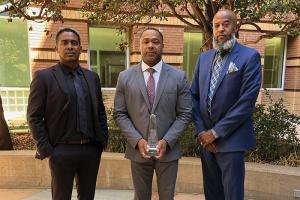Shining a light on people who work behind the scenes
Recently, Facebook founder Mark Zuckerberg shared his No. 1 hiring rule: “I will only hire someone to work directly for me if I would work for that person,” Zuckerberg stated. “It’s a pretty good test, and I think this rule has served me pretty well.”
This got me to wondering. Would Mark Zuckerberg work for me? Now, truthfully, I highly doubt that Zuckerberg is looking for a career change. But, putting aside the job itself, am I someone Zuckerberg would work for? Or maybe the better question is: Am I someone I would work for?
It always amazes me that our environmental services technicians come to work every day. They perform very physical work, their work is critiqued by not just one person, but by doctors, nurses, patients, visitors and their supervisors. Then consider that even after they’ve completed their assignments, they will need to repeat their tasks again and again; their work is never done.
Environmental services technicians are expected to be seen and yet unseen at the same time. They are to be cordial and polite. They are supposed to know all the answers and juggle many tasks but, for some reason, many only recognize them as the “cleaners.” Wow, I really don’t think I’d want to work for me. Why would I even consider this type of job that often is thought of as being menial, with an office located in the basement, hidden far back in the corner where few people see or venture?
But, without environmental services technicians, would the medical facility survive? That is a definite "no." We provide every patient the safe environment necessary to receive quality medical services. We make each facility a welcoming and pleasing place to visit, work and recuperate. We remove all the odors, the dirt and the crud (seen and unseen). We contribute to the feeling of safety and are the welcoming faces that everyone feels comfortable talking to. We are the go-to people when visitors have no idea where to go or where they are, because we cover every inch of the facility and we know it top to bottom. We are the soft smile when bad news is delivered, and we are the hand to hold when no one else is there. We are excited and eager to celebrate the good news and offer congratulations. And we never think twice about having to clean up an unpleasant mess.
Looking at it that way, I think I would work for me. I feel honored every day to be a member of the health care environmental services community. The position may not be as prestigious as a Facebook tech, but I think we come in ahead in terms of quality and customer satisfaction.
Kathy L. Meyer is the operations manager at Kentucky Building Maintenance, Batavia, Ohio.
Valuable resources available from AHE
AHE represents, defines and advances the professionals responsible for care of the health care environment to ensure high-quality outcomes and healthy communities. The following resources can be found at www.ahe.org/ahe/learn/tools_and_resources/publications.shtml.
• Recommended Practice Series: Environmental Services Equipment and Supplies. The equipment and supplies covered in this booklet are essential, discrete components of safe, efficient and productive environmental services operations.
• Practice Guidance for Healthcare Environmental Cleaning, second edition. This manual provides evidence-based research, guidance and recommended practices that should be considered for inclusion in health care environmental services departments. Because each health care facility has its own needs, this resource has been designed to enhance an existing program.
Environmental Sustainability Certificate Program
AHE has launched a new certificate program to acknowledge the ongoing and outstanding environmental and ecological sustainability efforts of environmental services departments. For more on the Environmental Sustainability Certificate Program, go to www.ahe.org/ahe/lead/environmental_sustainability_certificate_program.shtml.


